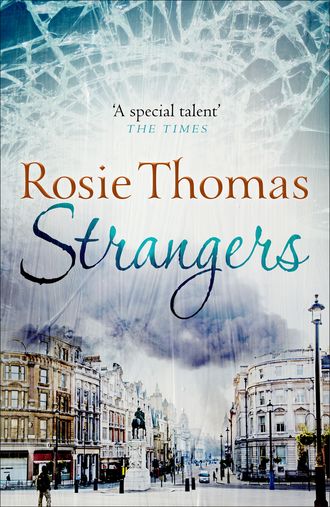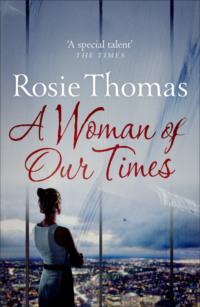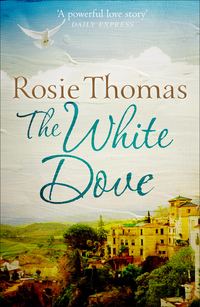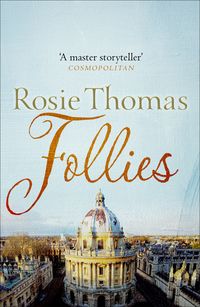
Полная версия
Strangers
‘Hold my hand again,’ she begged him.
He tucked the watch inside the fold of his coat and stretched out his hand. Their fingers touched at once, and they clasped hands.
‘That’s better,’ she said. Steve wanted to take her hand and rub it between his own, chafing the warmth back into it, and his powerlessness struck home to him. She was badly hurt, and if she were to deteriorate before they came, he could do nothing to help her. At the same moment he realized how important it was that she was there. If he were alone, would he want to fight so hard?
‘Tell me what you’re thinking about,’ he ordered her.
‘Not thinking. I keep seeing and hearing things. So vivid.’ Her voice sounded dreamy and distant now. ‘All the old things. They say that happens, don’t they?’
‘No. What things, Annie?’
She had been seeing last Christmas, and the decorated tree in the front window.
Benjy was just two, sitting on the floor with his eyes and mouth wide open, reaching out for the shimmer of it.
‘The boys. I was just seeing the boys. They grow up, and change all the time, but they still stay the same, themselves. If you haven’t got children yourself you can’t know what it’s like. I don’t think that even fathers have the same feeling.’
That was better, Steve thought, not really hearing what she said. Her voice was firmer now.
‘I never thought about it before they came. Even when we decided to have a baby, when I was pregnant, I never understood what it would be like.’
They had driven to the hospital together, Annie and Martin, when she went into labour. That was the last time, she understood afterwards, that little drive through the night, when they were just themselves.
Thomas had been born, a mass of black hair and a red, angry face. He had opened his eyes and looked at her.
In the days afterwards the weight of responsibility had been like a millstone, and at the same time the love had buoyed her up so that she felt she was floating. Whenever the baby cried she felt it inside her like a knife, and his hours of contentment filled her with a satisfaction she had never known.
Steve was listening now, compelled by the tenderness in her voice. Yet with half of himself he thought, Yes, I do know you. She was the kind of woman who undid the front of her dress at dinner parties, and serenely breast-fed a milky-smelling bundle of baby. She almost certainly went to classes to learn how to have her babies in the approved way, and demonstrated her success afterwards to an admiring circle of women around the table. She talked about children all the time. She was talking about them now, and the note in her voice held him. Yet she surprised him when she broke off and asked, ‘Sounds desperate, does it?’
He almost smiled. She was quick, and that was good.
‘Not desperate. I don’t understand, that’s all.’
‘Cass wanted a baby, did she?’
Quick again.
‘Yes, Cass wanted a baby. We talked about it, from time to time. Not much, in those last months, now I come to think of it. I was probably afraid that she might feel the same as you. No … I’m sorry, that didn’t come out quite right. I didn’t want to share her, perhaps. I wanted her to go on being Cass, not somebody’s mother.’
‘Somebody’s mother,’ Annie echoed softly.
Cass had sat cross-legged on the leather sofa, looking at him. She was wearing an armful of ivory and brass bangles and she turned them round and round, rattling them together.
‘What about your work?’ Steve had asked in exasperation.
‘Other women manage, don’t they? Quite a few of the girls I know do. We can always get a nanny to look after it while I’m working.’
‘Why bother to have a baby at all, then?’
She had looked at him with her green eyes wide open and the bangles rattled and clicked under her fingers.
‘Because I want one,’ she answered at last.
‘I don’t.’
Once there was a baby, the responsibility shifted. Steve knew that; he understood that much of what Annie said. And not wanting to share Cass, was that the truth? He lay still, feeling the pain in his leg pushing its fingers up into his groin, and tasted the deception in his mouth. It was Cass who had had to share him, unwittingly at first, and then with increasing bitterness.
On the day that he had announced to his partner that he was going to marry her, Bob had rocked back in his desk chair and stared at him in disbelief.
‘Married? You?’
‘Why not? You’re married, Phil is married, and so are most of my friends and all of our clients.’
‘Yeah. Not you, though.’
‘Perhaps I’m feeling the cold winds of solitude blowing around me.’
Bob had snorted with laughter. ‘Wrap it round yourself for warmth, then. Should be long enough – you’ve given it plenty of exercise.’
‘Fuck you, Jefferies.’
But Bob had only laughed even harder. ‘What, me as well?’
Steve had married Jennifer Cassady two weeks later. He was thirty-six, moving easily along the business track that ran from comfortably off to rich. He was amused at the prospect of having a wife, and captivated by Cass’s looks and abilities. They came from the same background and they were both busy climbing out of it. He thought they understood each other.
Cass was twenty-three and her career was blossoming. On the day that they were married, her face looked out across London from a hundred giant poster boards. It was suntan cream, that ad, Steve remembered. He had taken her out to dinner on the evening after she had been sent to the ad agency on a look-see for the same campaign.
On the day that they were married the party started at eleven o’clock sharp in the company’s offices in Ingestre Place. Bob had masked his cynicism with an ad-man’s enthusiasm, and had had every corner decorated with pink and white flowers. The bath in the directors’ bathroom was full of ice and three cases of Bollinger.
‘For starters,’ Bob had said.
The bride and groom had planned to walk the two or three Soho streets to the restaurant they were to take over for their lunch party. But when they came out of their offices an open-topped vintage bus fluttering with pink and white ribbons was blocking the roadway. The bus was crammed with a cheering crowd of friends and clients, except for two empty front top seats. One of the videotape editors was driving, and the creative director of a medium-sized agency was dressed up as the conductor, complete with a polished brass ticket machine.
Steve had stopped dead on the pavement, but Cass had pulled him on.
‘It’s perfect,’ she had breathed, half laughing and half crying. ‘Did you ever see anything so perfect?’
The lunch went on all day and well into the night. Steve remembered it in hazy patches. He remembered the strippergram, and he remembered Cass looking at him, proud and proprietorial, down the long table.
The marriage had lasted for two years and eight months.
Quite soon after the wedding a day came when he had had lunch with a pretty girl, and he had bought her brandy afterwards. They had leant back against the green, velvet-padded walls of the restaurant booth to look at one another, and Steve had suddenly realized that they were sizing one another up in the old way. Afterwards they had walked along a sun-warmed street and the girl had looked sideways at him and said, ‘Shall we go home for an hour?’
He had gone, almost without thinking, and he had enjoyed their rapid love-making more than he had done for months with Cass.
That hadn’t been Vicky. Vicky had come along months later, when Cass already knew what he was doing. For a time there had been the two of them, and the tissue of deceptions and faked meetings and unnecessary business trips that went with it. And then, two years and eight months after the pink and white wedding, Cass had left him.
‘I don’t blame her,’ the girl said.
The sound of her voice jolted Steve. For a moment, he hadn’t been buried at all. He had been back at home, in the flat that Cass had had redecorated after their marriage. Then the darkness closed around him again, and he remembered whose hand he was holding.
‘Feminine solidarity, is that it?’ he asked.
‘Partly.’ Her voice was crisp.
It occurred to Steve that this girl wasn’t so vulnerable. Then she added, ‘Personal sympathy, mostly. Thinking how I’d feel if Martin did it.’
‘And he doesn’t?’
Almost to her surprise, Annie understood that it wasn’t a taunt. He was asking a simple question.
‘No, I don’t think so.’
Martin came home between six and seven o’clock every evening. She was always glad to hear his bag thud on to the step as he dropped it to search in his pockets for the key. Tom would look up from his drawing, or the Lego, or the television, and say, ‘Dad’s home.’ And if Benjy was still up he would slither in his pyjamas to the front door to meet him.
Seeing herself waiting with the boys, and a glass of wine, and the dinner simmering, Annie sometimes thought bleakly that they were like a family in a television commercial. Just as predictable. Almost as bland. Yet Martin did come home every night, to hug them in turn and to listen to the boys’ recital of the day’s events. After the boys had gone to bed they would sit down to dinner together, adding up in their talk the small change of another day. Annie knew the hours and the demands of Martin’s job because he told her. She knew that there was no room in his life, between his work and the three of them waiting for him at home, for anyone else. She was glad of that.
And when the monotony of domestic life bored her, or the boys were awkward, or she was simply afraid that life was slipping past her in a succession of featureless days, she reminded herself carefully that her life was her own choice. She had chosen the smooth path that led round and round her family and her home.
Suddenly, with the pain like a hot band around her, Annie felt a longing for her life that hurt more than the pain of her body. It came back to her in every detail, the intimate pattern of their daily life. She smelt the freshness of clean sheets as she smoothed them out over the double mattress, heard the ping of the alarm clock on Martin’s side of the bed, and saw the house glow in all its worn, crowded, family-rubbed, patinated richness.
‘I don’t want to die,’ she said.
Only a few days ago, she had sat over dinner with Martin and talked about what she hoped to do when Benjy went to full-day nursery. She would start work again, perhaps, just for a few hours a week. She had had the sense of wider avenues opening, giving new perspectives that would still let her stay in the places she loved. She had sensed her own good fortune like a jewel hanging round her neck.
‘I can’t bear to leave it.’
The man’s hand holding hers was gentle.
‘You aren’t going to die.’
Out in the daylight it had stopped snowing, and it was growing steadily colder. The policemen manning the cordons moved to and fro across the strip of roadway to keep their feet warm, and their breath hung in front of them in grey clouds. The television crews, with the sightseers beyond them at a distance, huddled in their overcoats and waited as the minutes passed.
The slow, painstaking process of lifting the girders and rubble out of the hole had begun an hour ago. Now there was a flurry of movement amongst the firemen working under the tilted, ragged floors of the store. A broken beam was winched up and swung away to the side and one of the waiting ambulances started up and inched forward. A stretcher was carried across to where the firemen and doctors crouched in a circle, looking down. Then one of the doctors stood up and stepped backwards, over the heaps of wreckage. The firemen worked on until the watchers saw a flutter of something pale as another chunk of masonry was pulled away. A moment later a woman was lifted out of the hole. They laid her on the stretcher, and covered her face with a blanket.
The only sound was the crowd’s sigh, as if it came from a single throat.
The cameramen swung their long black lenses with the stretcher as it was carried, swaying and bumping, over to the ambulance. It was lifted inside and the heavy doors slammed. A moment later the ambulance nosed slowly away down the street.
‘Fight for it, if you want it so much.’
Annie only half heard him. The sense of what she would lose had taken such a powerful hold of her. Her life seemed her own creation, not passionate or original, but warm, and sweet, and infinitely valuable. The threatening darkness, looming and shivering over her head, was unbearable. She wanted to move, throwing her limbs convulsively to fight her way out of it, and yet she couldn’t. Her body hurt, and where it didn’t hurt it didn’t seem to exist any longer. Claustrophobia took hold of her and she felt a scream of terror rising again in her throat.
Annie opened her mouth and the scream came, and she heard the invisible mass around her swallow it up like a whisper.
‘Don’t,’ Steve said harshly. ‘Save that for when they might be able to hear us.’
Could they hear? Where were they? He felt the darkness as a weight now, too, heavy all around them. He strained his ears for a sound of the rescue that his reason told him must be under way, but he could hear nothing except the multiplying echoes of Annie’s scream.
‘Wait,’ he whispered. He let go of her hand and moved his arm across his chest to feel for the watch. His fingers felt numb, but he stroked the face of it, trying to make sense of the tiny hands. He thought it might be half past eleven, and so a whole hour had passed, but then he realized that the hands might just be in the same position as last time. Perhaps he had misread them then, and the watch was broken after all. The dislocation frightened him. He had relied on being able to monitor the time passing, thinking that he could gauge how their strength was holding out. Then he felt the second hand brush against his fingertip again. He slipped the watch back into its place, reassured, and reached out for Annie’s hand again.
‘It’s half past eleven. A whole hour has gone. We’re doing all right.’
The relief in his voice and the touch of his hand pushed Annie’s fear back again.
Fight, he had said, if you want it so much. To live. She moved her head and felt the door tilted against her cheek.
‘You want to fight,’ she said. ‘It’s precious for you, too, isn’t it?’
Precious?
Steve tasted the word, trying it out against his memories of the last months. He began to understand it for Annie, listening to her talk about her children. The need to see them growing up, the fierce determination to protect them that he had glimpsed fleetingly in other women, that was part of her. He had nothing like that. Steve thought often, without much surprise or regret, that he was living at one step removed from life.
How long then, since the sharp edge of pleasure had gone? Not just pleasure, but anticipation, need, fear, even?
He thought backwards, a long tunnel of days and nights.
Before Vicky. He had wanted Vicky, but he had also been quite sure of getting her.
He had met her at a party, a party for a book that Cass had done some modelling for. Vicky worked for the publishing company. She looked frumpy, in a corduroy skirt and a thick, knitted jersey. They had been introduced and Steve had asked some polite questions and then looked past her, to see where Cass had gone. But Vicky had moved to stand squarely in front of him again. Then he had noticed that she had unusual dark eyes in a clever, challenging face, and that something was amusing her. He suddenly realized that he wanted to find out what it was, and at the same moment Vicky had shifted her weight, resting it on one leg with the other knee bent. She had tilted her head to one side, still looking at him, and he had imagined the line of her body under the thick clothes. They had talked for a moment or two more and then Vicky had licked the corner of her mouth, quickly, like a cat. She had put her hand up to cover it, like a schoolgirl trying out a kiss in the mirror. They had both laughed, then.
Steve had taken her to bed two days later. Her inventiveness, her energy and her exotic tastes had surprised him.
‘Did you learn that at LMH?’ he had asked.
‘Some of it,’ she grinned at him.
Yet even then he had been moving with the sense of inevitability, and their affair had unfolded in front of him as though he were watching it on screen.
Was he so used to the distance, then, that he couldn’t remember when it had opened up? Steve lay still, feeling the cramp in his outstretched arm and listening to the painful, irregular indrawn breaths of the girl beside him. The girl was real, he felt her as close as if he were holding her in his arms. He was waiting for each of her breaths, willing her to draw the next, and the next. The blackness was real, and so was the dust that coated his mouth and stung in his eyes, and the pain was real too.
Steve felt a sudden frightening desire to laugh at the fact that it should take this to stir him. He understood the fragility of his life and the possibility of survival, the need for it, reared in front of him like a wall. He was afraid, as frightened as Annie was, but he forced himself to shake off the clutch of it with a determination that was almost pleasurable.
Precious, she had said. No, his life wasn’t that. It was hollow and mechanical and faintly shameful. The need to laugh faded, and Steve saw as clearly as if a bright light had been turned on overhead that what was precious was the need to fight, and he had lost that long ago.
‘I always wanted to be rich,’ he said.
‘And are you?’
He thought for a moment. ‘It’s a long time since I’ve had to live without something I wanted because I didn’t have the money to buy it.’ There was a pause before he added, ‘The natural result is that you find yourself not wanting anything anyway. I’ve got a handsome, rather unlived-in flat and several quite good modern paintings. I’ve got a little house in the hills behind Draguignan that I hardly ever go to. I’ve got a BMW, more suits than I can get around to wearing, all sorts of things. What else is there?’
Annie listened, trying to picture what he looked like from the sound of his voice and the warmth of his hand. Something in what he said touched her. She knew that he had never said it before.
‘Is that what you wanted?’ she asked.
Steve didn’t answer. To have answered would have been to peer into an abyss, gaping darker than the real darkness where they lay. It was suddenly so very far from what he wanted that he had completely lost his bearings. Wasn’t there anything, then, waiting, if this weight was ever lifted off the two of them?
He lifted his head an inch or two, straining his neck muscles, as if the hopeless movement could push the wreckage and let the daylight come flooding down.
Was it still snowing? What were they doing up there, so long?
‘I want to stay alive, like you,’ he whispered. He did, and he wouldn’t let himself ask, For what?
‘We will be saved,’ she whispered back to him. ‘I know we will.’
Steve wanted to reach out and take her in his arms. It was the first flicker of her own determination, not cajoled from her by his own will. He felt the warmth of gratitude and it was like weakness because his eyes suddenly filled with tears.
No. Don’t do that. It was important not to be weak. He must keep on holding her hand, listening to her breathing.
‘And you, Annie? Have you got what you want?’
She was vividly aware of the truth that he had offered her. She could feel the intimacy uncoiling between them, incongruous, yet as important as the need to contain the pain, as important as holding on to her wavering consciousness.
She would offer him the truth in return.
Very quietly, so that he had to strain to catch the words, she said, ‘I chose the easy option.’
Two
Martin waited until the kettle boiled and the automatic switch clicked back into the off position. He took the coffee jar out of the cupboard and spooned the granules into a flowered mug, then poured the water in so that the liquid frothed up in black bubbles. He opened the door of the refrigerator and peered in, frowning when he saw that there was no milk. Then it occurred to him that the milkman must have been and gone by now. He went up the steps from the kitchen into the hall and pulled the door open over the scatter of minicab cards and free newsheets that had been pushed in through the letterbox. His frown vanished when he saw that there were four pints of milk beside the doormat in the porch. He was whistling as he scooped them up and carried them back into the kitchen. He left three bottles on the worktop and splashed milk from the fourth into his coffee mug. Then, with his thumb hooked over the end of the spoon still standing in it, he carried his coffee through into the sitting room where the boys were sitting side by side on the rug. They were watching Saturday morning television.
As he came in Thomas jumped up and jabbed the buttons.
‘Nothing on,’ he complained.
Martin saw the news picture of the store with the jagged cleft struck through the middle of it, and he caught the reporter’s words.
‘… this morning just after nine thirty. One body has already been recovered from the wreckage, and the search continues. Police have not yet confirmed …’
The image vanished as Thomas impatiently prodded again. It was replaced by the test card of another channel, then by a commercial for breakfast cereal.
‘I like this one,’ Benjy shouted.
Martin stood for a frozen second, seeing his sons’ heads bobbing up and down, hiding the little square of coloured screen. Then he lunged forward and the hot coffee splashed over his fingers. He stepped between the boys and crouched down in front of the set, fumbling for the channel button.
He heard Thomas protest, ‘Oh, Dad …’ and then the picture flickered and steadied itself again. He saw a reporter standing in a windswept street with a hand microphone held close to his mouth. Behind him Martin could see a corner of the store, its bulk oddly foreshortened. He knew exactly where it was without having to listen to the report. Annie had lived in a poky little flat in one of the little streets behind it in the days before they were married. They had walked past the high façade a hundred times on their way to a pub that they liked, just beyond the tube station. The tube was just opposite the store, away to the news reporter’s right.
‘No survivors have been found as yet, but one body was lifted out a few moments ago …’
What was he saying?
Martin knelt down, pressing closer to the screen as if he could draw a contradiction of the implacable picture from it. He saw the reporter’s cold-pinched face dissolve into its component blips of colour, but the hideously altered shape of the big store never wavered.
‘Hush, Tom,’ he said.
What had Annie told him? He struggled to recall the casual words, seeing her run upstairs towards him as he stood with Benjy in his arms. She hadn’t said exactly where she was going. But it was a direct journey from here by tube. And Annie often shopped there. It was almost ‘her’ store, from the days when she had lived so close to it. As he watched the camera panned away from the newsman to a limited panorama of ambulances and fire engines. There were firemen working in yellow helmets, and policemen hemming them in.
Martin was cold, trembling with it, and the sick certainty that Annie was there. What had the man said?
One body was lifted out a few moments ago …
Martin stood up, almost stumbling, and the coffee splashed again. He put it down on top of the set and in the same moment the report ended. The picture changed to a solemn-faced studio continuity announcer.









